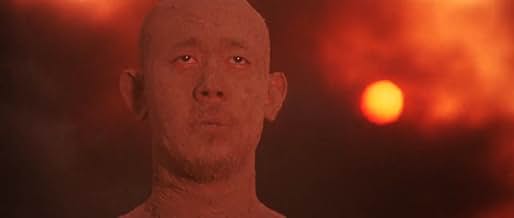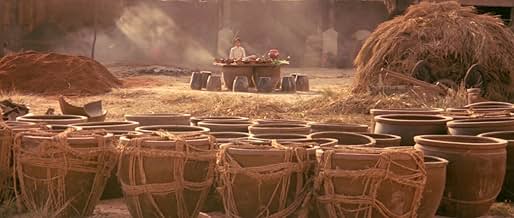IMDb-BEWERTUNG
7,3/10
10.418
IHRE BEWERTUNG
Füge eine Handlung in deiner Sprache hinzuWhen a leprous winery owner in 1930s China dies a few days after his arranged marriage, his young widow is forced to run the winery to make a living while contending with bandits, her drunka... Alles lesenWhen a leprous winery owner in 1930s China dies a few days after his arranged marriage, his young widow is forced to run the winery to make a living while contending with bandits, her drunkard lover, and the invading Japanese army.When a leprous winery owner in 1930s China dies a few days after his arranged marriage, his young widow is forced to run the winery to make a living while contending with bandits, her drunkard lover, and the invading Japanese army.
- Auszeichnungen
- 17 Gewinne & 7 Nominierungen insgesamt
Rujun Teng
- Wo Luohan Yeye (Uncle Luohan)
- (as Rujun Ten)
Empfohlene Bewertungen
10P-Style
Red Sorghum will delight those that enjoy the art of cinematography. This visually stunning film truly deserves its international acclaim simply because of the way it presents the tale through its remarkable use of imagery, lighting, and filters.
Until I saw this film, I would have never thought that one could say so much about character, setting, mood and plot simply through the use of layout and image composition. This controversial film set in the 1920's - 1930's, by the rebellious Zhang Yimou, follows the life of sorghum wine farmers from Northern China.
If you follow the history of Chinese film, you will see how nicely this film combines motif's of many of its precursor films. Chinese history and culture has been vastly explored through many Chinese films, however I believe that this is a good film for the average American film goer to get a taste of the Chinese film industry and culture through their perspective. I say this for a variety of reasons, the pacing of this drama is quicker and faster moving compared to other related Chinese films before its time. Generally Chinese film have a tendency to be slow, when set aside the general American preferred standards.
It presents to us some of the Northern Chinese cultural traditions. Its display of the Japanese brutality could not have been better presented. The Japanese have been quite swinish during this period in Chinese history. All I can say is it says it all as it really was, very well indeed.
This is the last but most important reason to watch this film... look at its cinematography. It has to be among the best I have ever seen. It amazed me to see how resourceful a cinematographer can be when working for a film of little budget. Yimou showed me how simple things can be filmed to be works of art. Unfortunately I have not been able to see the film in its original cinematic scope however, even in full screen it is still quite visually stunning. The aperture, f-stop and lens settings were set just perfectly giving the film a very rich vibrant look making Yimou my favorite Chinese film cinematographer/director of all time to date. Oh, it is a film that you just have to see for yourself! Hope you enjoy it! Happy Viewing!
Until I saw this film, I would have never thought that one could say so much about character, setting, mood and plot simply through the use of layout and image composition. This controversial film set in the 1920's - 1930's, by the rebellious Zhang Yimou, follows the life of sorghum wine farmers from Northern China.
If you follow the history of Chinese film, you will see how nicely this film combines motif's of many of its precursor films. Chinese history and culture has been vastly explored through many Chinese films, however I believe that this is a good film for the average American film goer to get a taste of the Chinese film industry and culture through their perspective. I say this for a variety of reasons, the pacing of this drama is quicker and faster moving compared to other related Chinese films before its time. Generally Chinese film have a tendency to be slow, when set aside the general American preferred standards.
It presents to us some of the Northern Chinese cultural traditions. Its display of the Japanese brutality could not have been better presented. The Japanese have been quite swinish during this period in Chinese history. All I can say is it says it all as it really was, very well indeed.
This is the last but most important reason to watch this film... look at its cinematography. It has to be among the best I have ever seen. It amazed me to see how resourceful a cinematographer can be when working for a film of little budget. Yimou showed me how simple things can be filmed to be works of art. Unfortunately I have not been able to see the film in its original cinematic scope however, even in full screen it is still quite visually stunning. The aperture, f-stop and lens settings were set just perfectly giving the film a very rich vibrant look making Yimou my favorite Chinese film cinematographer/director of all time to date. Oh, it is a film that you just have to see for yourself! Hope you enjoy it! Happy Viewing!
Red Sorghum. Red is for blood. Blood/Wine coursing through your veins. Blood Pumping Love in your heart and Courage as well. Blood of your loved ones killed in war. Blood of your enemies. Blood of your Brothers. I get it now. I remember his masterful use of color. Just like how he retells the stories in different colors for "Hero". This is how I felt after watching "Red Sorghum."
Gong Li is stunning as usual. Check out Zhang Yimou as Brother Lohan. He displays such dignity. Muscle Man quite often steals the show with his bravado. The songs are uplifting and beautiful to hear. The scenery takes you away and the fields of sorghum are alive and pulling you in like Nature Herself.
While gutwrenching like his other movies, the characters in this one are especially endearing in their loyalty to each other. What more can I say. Poetry brought to life.
Gong Li is stunning as usual. Check out Zhang Yimou as Brother Lohan. He displays such dignity. Muscle Man quite often steals the show with his bravado. The songs are uplifting and beautiful to hear. The scenery takes you away and the fields of sorghum are alive and pulling you in like Nature Herself.
While gutwrenching like his other movies, the characters in this one are especially endearing in their loyalty to each other. What more can I say. Poetry brought to life.
Credit goes to Yimou for stripping this epic 2 novel series down to this spare and gorgeous little hour and a half. For all the recent fantastic forays into Chinese fantasy, this story (which is allegedly true) shown as it is, is as close to a fairy tale as it gets, at least until the very end. Every shot is a painting. For some reason this film is still near-impossible to find on DVD. I truly hope it is not being suppressed for anti-Japanese sentiment expressed in it. That would be a terrible shame. This film was released shortly before Tienanmenn (sp) and it has a boldness and frank humor rarely seen in Chinese film since.
The much heralded renaissance of New Chinese Cinema can be an acquired taste to many Western filmgoers, but this handsome period piece (directed by the cinematographer of 'Yellow Earth', 1984) is livelier and more accessible than most. Part folk tale, part historical drama, it tells the story of a young virgin (sold by her father into marriage with a wealthy leper, in return for a mule), who after her husband's mysterious death continues to run his successful vineyard, with help from her loyal wedding bearers. And yet for all its undeniable physical beauty and colorful action the film can be a dry experience, at least until the outbreak of the second Sino-Japanese War in the 1930s. With the Japanese occupation some emotional urgency finally breaks through the film's mantle of reserve, which up to that point had marked even the more bawdy episodes of communal singing and drinking.
There are several versions of this film available on video. Some are in wide screen, some aren't. The impact of the visuals is lost without the full-shot wide screen. Then there are two different subtitled versions, one that has large subtitles and another that uses smaller but less intrusive subtitles, which is the best of the two. So depending on what version of the video you're watching, your experience of the film can vary. But assuming you get your hands on the good version...
This film is like a quiet fairy tale that transforms into something that I didn't see coming. The visuals are stunning. The story slowly unfolds but is presented so well that it's completely compelling. The acting is as good as it gets. And the ending hits you like a punch in the stomach.
This films stands out from all other Chinese films I have seen. It has a character uniquely its own, and is well worth seeking out.
This film is like a quiet fairy tale that transforms into something that I didn't see coming. The visuals are stunning. The story slowly unfolds but is presented so well that it's completely compelling. The acting is as good as it gets. And the ending hits you like a punch in the stomach.
This films stands out from all other Chinese films I have seen. It has a character uniquely its own, and is well worth seeking out.
Wusstest du schon
- WissenswertesThe films screenplay was based on the novel of the same name by Chinese author Mo Yan. In 2012, Mo Yan was awarded the Nobel Prize in Literature. The Swedish Academy awarded him the prize as an author "who with hallucinatory realism merges folk tales, history and the contemporary".
- VerbindungenFeatured in Das Turandot Projekt (2000)
Top-Auswahl
Melde dich zum Bewerten an und greife auf die Watchlist für personalisierte Empfehlungen zu.
- How long is Red Sorghum?Powered by Alexa
Details
Box Office
- Weltweiter Bruttoertrag
- 108.371 $
- Laufzeit
- 1 Std. 31 Min.(91 min)
- Sound-Mix
- Seitenverhältnis
- 2.35 : 1
Zu dieser Seite beitragen
Bearbeitung vorschlagen oder fehlenden Inhalt hinzufügen

























